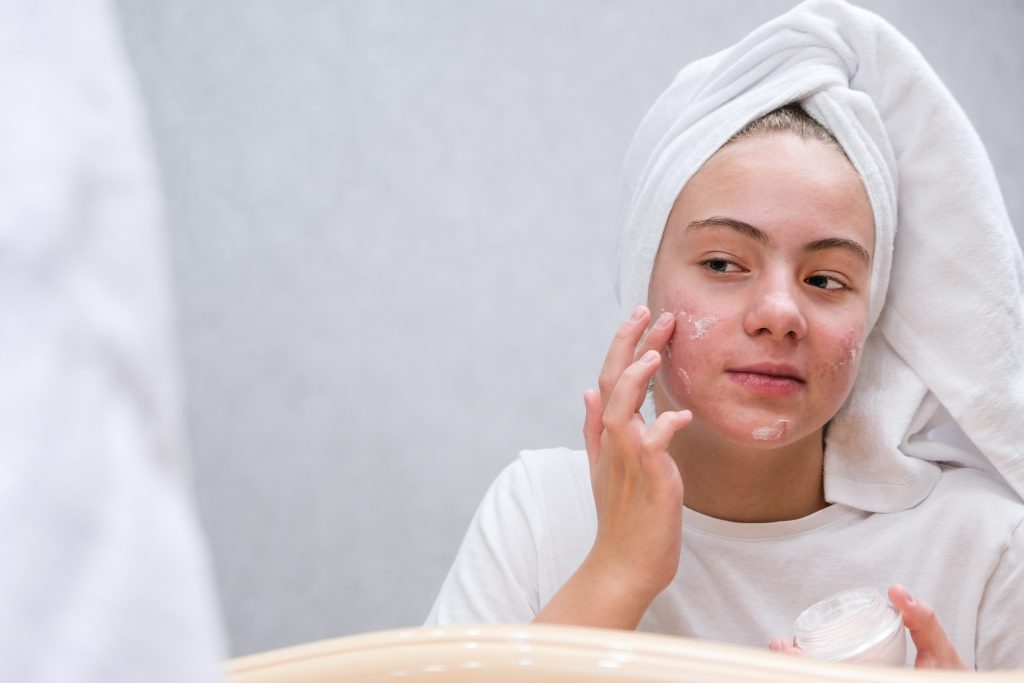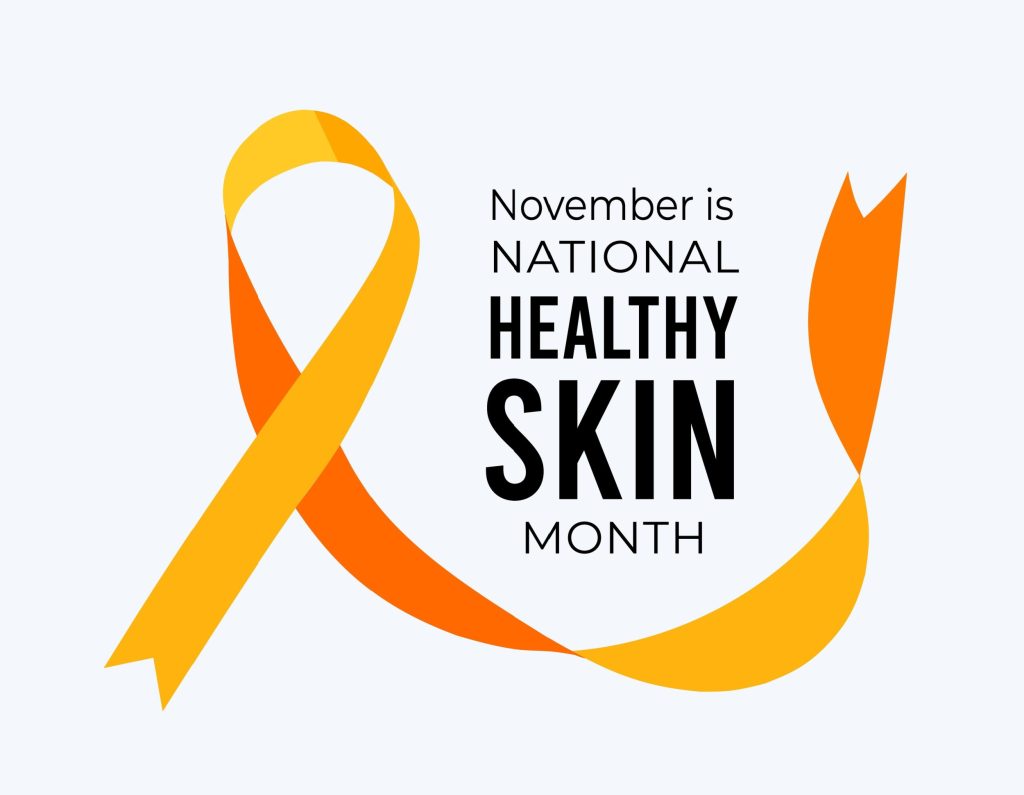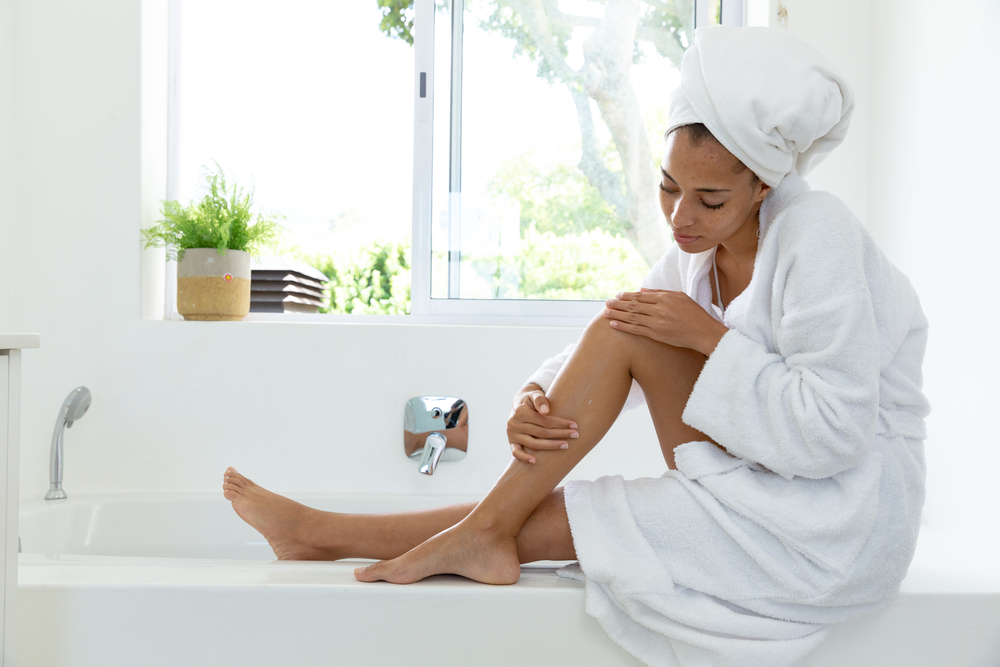
Many factors contribute to acne breakouts. It doesn’t matter if you are in your teens, twenties, thirties, forties, or beyond; you may experience frustration with acne. Acne for people of all ages is generally caused by a buildup of bacteria, skin cells, and oil that clogs skin pores and causes breakouts of pimples, whiteheads, and blackheads.
While teenagers tend to see acne in a pattern all over their faces, adults are more likely to develop bumps around the lower face, jawline, chin, and neck. Adults also suffer with fewer whiteheads and blackheads than their teen counterparts. Adult acne largely appears as big, red, irritated cystic bumps. Body acne can also occur but is not as common among older men and women, as oil glands on the chest and back become less active with age.
While a family history and genetic predisposition may be causing your acne, it is probable that a combination of hormones, stress, and dietary factors is to blame for the outbreaks.
Hormones
Hormones are the most common culprit behind acne breakouts. Women are more prone to hormone-driven flare-ups for several reasons – during a woman’s monthly menstrual cycle, estrogen levels dip while testosterone levels rise. Testosterone is an androgen, which is a male hormone that stimulates oil and hair follicle production and leads to excess oil that clogs pores and produces bacterial overgrowth. This is a perfect storm for the creation of acne. Menopause and pregnancy can also cause hormonal fluctuations that affect oil glands in the skin.
For men, higher levels of testosterone can also cause hormonal acne due to the increase in production of sebum, a protective coating on the skin that is oily and waxy.
If you are experiencing a breakout, it’s important not to pick or squeeze your blemishes, as these will only make them worse and potentially lead to infection.
Managing hormonal acne involves a combination of lifestyle changes, skin care routines, and possibly medical treatments. Maintain a consistent skin care regimen that includes gentle cleansing twice daily, using non-comedogenic products, and applying treatments containing benzoyl peroxide or salicylic acid. Incorporate a healthy diet with reduced dairy and sugar intake, as these can influence hormone levels. Stress management techniques, as explained below, can also help balance hormones. For persistent or severe cases, consult a dermatologist.
Stress
By now, you are probably aware of the negative effects stress has on the body – too much stress can lead to weight gain, low energy, hair loss, and more. It can also be the reason behind acne. When the body is under stress it produces more cortisol, a hormone that causes increased oil production and inflammation.
Stress also releases androgen (the male hormone we discussed above) into the body at higher levels, which in turn stimulates oil glands and leads to the appearance of red, inflamed bumps on the face.
Managing stress-induced acne involves a combination of stress management techniques and proper skin care. Begin by incorporating stress-reducing activities such as exercise, meditation, and adequate sleep into your routine. Practice good skin care by cleansing your face twice daily with a gentle cleanser, using non-comedogenic moisturizers, and avoiding harsh products that can irritate your skin. If your acne persists, consult a dermatologist for personalized advice and possible prescription treatments.
Diet
Ever heard the saying that eating too much junk food can cause acne? There may be some truth in that. When the body produces too much insulin it triggers production of the hormone androgen, which in turn increases oil production in the skin and leads to acne breakouts. Excess insulin is released when the body digests foods with a high glycemic index – including refined starches such as pasta, cereal, rice, and bread. Starches and sugars affect insulin levels, so fill your plate with fresh fruits and vegetables instead, along with complex carbohydrates that have a low glycemic index, like whole grain oats or sweet potatoes. Certain meats and dairy products can also be hormone-heavy and can also cause breakouts, so you may want to eat these in moderation.
If you have an inflammatory skin condition like psoriasis, rosacea, or eczema, a spike in inflammation can trigger or exacerbate your symptoms.
Hair and skin products
Good skin care is an important element of keeping acne at bay, but too much of a good thing can actually do the opposite of what you are trying to achieve. Over-washing and scrubbing can strip the skin of its moisture and cause oil glands to work overtime. Harsh skin care products, or overloading on several different products can also upset your skin’s balance and end up causing even more skin problems, such as flaking, peeling, itching, or redness.
When you are purchasing new personal care products, look for one or more of the following terms: oil-free, water-based, non-comedogenic, and acnegenic. Oil-free and water-based products will keep your facial pores from becoming clogged with bacteria and skin cells, thus preventing an acne breakout. The American Academy of Dermatology Association recommends products that are alcohol-free. It is also suggested that you do not use products that irritate your skin, which may include astringents, toners and exfoliants. Dry and red skin can make your acne seem worse.
Exercise
While exercising is recommended and crucial to staying healthy and fit, it’s the sweating that can bring on unwanted acne. The combination of heat, moisture, and friction can lead to clogged pores. To help aid in the fight against sweat-induced acne, you should:
- Wipe your face with a cleansing towelette before exercising to remove oil, dirt, and any makeup.
- Use a clean towel to wipe off your sweat during your workout and wash your face with a mild, oil-free cleanser immediately following your exercise.
- Follow up with a moisturizer suited for your skin type, and sunscreen, especially if you are going outdoors.
Your Action Plan
For all men and women with acne, simple at-home measures can be taken to lower your chances of a breakout. Use a gentle, water-based cleanser to wash your face daily, try activities to lower your stress, and eat a well-balanced diet high in fresh vegetables and whole grains. And remember you do not have to suffer in silence – acne is highly treatable under the care of a trusted dermatologist.
At Florida Dermatology and Skin Cancer Centers, our board-certified dermatologists are qualified to effectively diagnose and treat your acne symptoms with tailored options that will work for you.
Florida Dermatology and Skin Cancer Centers Addresses All Skin Concerns
At FLDSCC, our medical staff are experts in all skin, hair, and nail conditions. We’re happy to perform a head-to-toe evaluation and recommend skin care solutions that will keep your skin healthy and radiant. Contact us today or stop by one of our convenient locations to schedule an appointment.


